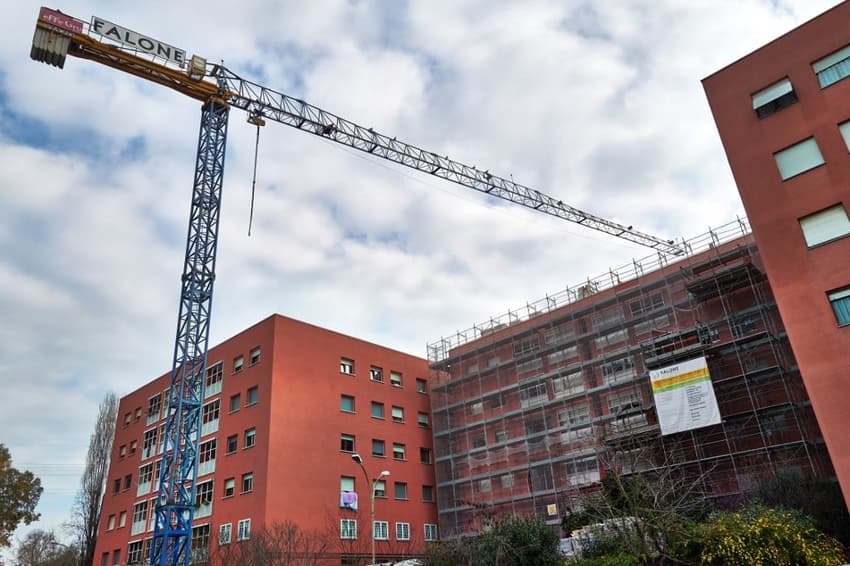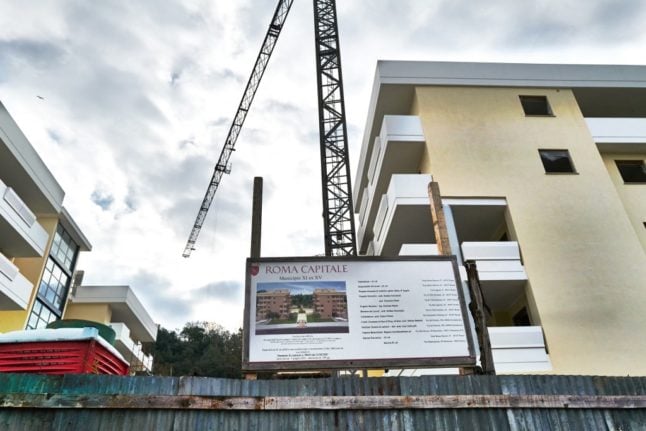'Out of control': Why has Italy curbed its building superbonus?

Italy’s ‘superbonus 110’ fund for home renovations has been wildly popular, but the government has abruptly reined it in amid fears it will send the country’s deficit soaring.
The superbonus, which can be used for anything from insulation to solar panels, new boilers and windows, was introduced in May 2020 to boost the Italian economy amid the coronavirus lockdown - and, the government said at the time, to make homes more energy efficient
READ ALSO: Has Italy's superbonus been scrapped?
Environmentalists were sceptical about its benefits, but property owners rushed to take advantage of the generous discounts - with state funding available for up to 110 percent of the cost of certain types of renovations.
But the current Italian government curbed the scheme without warning earlier in February - leaving homeowners concerned about the viability of ongoing projects, and tens of thousands of construction companies saying they risk going bankrupt.
The superbonus scheme was introduced amid the pandemic by former premier Giuseppe Conte, whose populist Five Star Movement led the government at the time.
The bonus allowed homeowners to either deduct the cost of work from their taxes over several years or sell the tax credit to their builder, who would sell it to a bank, which would then claim the money from the state.
The current government, led by Prime Minister Giorgia Meloni, has now halted access to any further tax credits, meaning the only option now is a tax rebate - but this is only available to those paying the highest rates of income tax.
While the bonus has not been scrapped entirely, the abrupt changes mean it’s now so tightly restricted that new claims are effectively impossible for most people.
So why did Meloni’s government suddenly pull the plug?
The extreme popularity of the scheme means that funding has already been claimed in excess. Almost three years after the superbonus was introduced, it has cost the state a total of €61.2 billion - a figure Meloni says is “out of control”.
Spiralling costs
Meloni, whose coalition government took office in October, has long been a critic of the superbonus and speculation was rife following her election that her government would seek to end the scheme.
Defending the further changes on February 17th, Meloni said the scheme had led to fraud worth nine billion euros, while the tradeable nature of the tax credit system it is based on had "generated a sort of parallel currency, and that parallel currency risks having a devastating impact on the budget".
Finance Minister Giancarlo Giorgetti meanwhile described it as a "wicked policy".
Meloni's government has already sought to restrict the subsidy, reducing the bonus from 110 percent to 90 percent from the beginning of 2023.

Construction works on the outskirts of Rome in 2021 under the superbonus scheme. Photo: Andreas SOLARO/AFP
But the government abruptly stopped issuing tax credits as of February 17th amid concern about the impact of the system on the country’s already high budget deficit.
Reuters reports that the reason is a ruling this month by the European Union's statistics agency Eurostat on the way tax credits are classified in state accounts, which strongly impacts costly schemes offering incentives for energy saving home improvements.
In November, Italy’s government forecast the 2022 deficit would fall to 5.6 percent of GDP, but as a result of these accounting changes the figure may now exceed 7 percent.
Revised figures potentially incorporating the superbonus scheme are due from Italy's statistics bureau Istat on March 1st.
Lorenzo Codogno, a former chief economist at Italy's Treasury, told AFP that Italy's deficit could be revised up substantially, while both the construction sector and the government "could have liquidity problems".
Construction boom
As intended, the superbonus boosted the construction sector - which grew by 21.6 percent in 2021, helping fuel a post-pandemic boom.
But the scheme generated much more work than expected, and banks stopped buying credits last year, leaving many homeowners and construction companies in the lurch.
The government says it is now looking into possible alternatives to the credit system and exploring ways to plug a gap in funding which construction industry association ANCE says is putting 25,000 companies at risk.
READ ALSO: Italy’s building firms warn of bankruptcy risk after superbonus changes
Climate campaigners hope that the government will also change the scope of the bonus.
Experts have lamented what they see as a wasted opportunity to engineer a cultural shift towards building truly green housing.
In a study last year, the Bank of Italy said the superbonus was "not a cost-effective way" to tackle climate change.
Matteo Leonardi, co-founder of Italian climate change think tank ECCO, said it lacked "ambition".
"It has not been linked to climate targets, which is what would have justified the costs," he told AFP, adding that renovations had only to boost efficiency by two energy classes.
It also did not sufficiently promote innovative but less familiar technologies, such as heat pumps.
But Leonardi said for all its faults, the superbonus had value if radically revised to meet more ambitious targets.
With the tax credits gone, he said the government is now "just giving a lot of money to high-income families to install gas boilers".
Comments
See Also
The superbonus, which can be used for anything from insulation to solar panels, new boilers and windows, was introduced in May 2020 to boost the Italian economy amid the coronavirus lockdown - and, the government said at the time, to make homes more energy efficient
READ ALSO: Has Italy's superbonus been scrapped?
Environmentalists were sceptical about its benefits, but property owners rushed to take advantage of the generous discounts - with state funding available for up to 110 percent of the cost of certain types of renovations.
But the current Italian government curbed the scheme without warning earlier in February - leaving homeowners concerned about the viability of ongoing projects, and tens of thousands of construction companies saying they risk going bankrupt.
The superbonus scheme was introduced amid the pandemic by former premier Giuseppe Conte, whose populist Five Star Movement led the government at the time.
The bonus allowed homeowners to either deduct the cost of work from their taxes over several years or sell the tax credit to their builder, who would sell it to a bank, which would then claim the money from the state.
The current government, led by Prime Minister Giorgia Meloni, has now halted access to any further tax credits, meaning the only option now is a tax rebate - but this is only available to those paying the highest rates of income tax.
While the bonus has not been scrapped entirely, the abrupt changes mean it’s now so tightly restricted that new claims are effectively impossible for most people.
So why did Meloni’s government suddenly pull the plug?
The extreme popularity of the scheme means that funding has already been claimed in excess. Almost three years after the superbonus was introduced, it has cost the state a total of €61.2 billion - a figure Meloni says is “out of control”.
Spiralling costs
Meloni, whose coalition government took office in October, has long been a critic of the superbonus and speculation was rife following her election that her government would seek to end the scheme.
Defending the further changes on February 17th, Meloni said the scheme had led to fraud worth nine billion euros, while the tradeable nature of the tax credit system it is based on had "generated a sort of parallel currency, and that parallel currency risks having a devastating impact on the budget".
Finance Minister Giancarlo Giorgetti meanwhile described it as a "wicked policy".
Meloni's government has already sought to restrict the subsidy, reducing the bonus from 110 percent to 90 percent from the beginning of 2023.

But the government abruptly stopped issuing tax credits as of February 17th amid concern about the impact of the system on the country’s already high budget deficit.
Reuters reports that the reason is a ruling this month by the European Union's statistics agency Eurostat on the way tax credits are classified in state accounts, which strongly impacts costly schemes offering incentives for energy saving home improvements.
In November, Italy’s government forecast the 2022 deficit would fall to 5.6 percent of GDP, but as a result of these accounting changes the figure may now exceed 7 percent.
Revised figures potentially incorporating the superbonus scheme are due from Italy's statistics bureau Istat on March 1st.
Lorenzo Codogno, a former chief economist at Italy's Treasury, told AFP that Italy's deficit could be revised up substantially, while both the construction sector and the government "could have liquidity problems".
Construction boom
As intended, the superbonus boosted the construction sector - which grew by 21.6 percent in 2021, helping fuel a post-pandemic boom.
But the scheme generated much more work than expected, and banks stopped buying credits last year, leaving many homeowners and construction companies in the lurch.
The government says it is now looking into possible alternatives to the credit system and exploring ways to plug a gap in funding which construction industry association ANCE says is putting 25,000 companies at risk.
READ ALSO: Italy’s building firms warn of bankruptcy risk after superbonus changes
Climate campaigners hope that the government will also change the scope of the bonus.
Experts have lamented what they see as a wasted opportunity to engineer a cultural shift towards building truly green housing.
In a study last year, the Bank of Italy said the superbonus was "not a cost-effective way" to tackle climate change.
Matteo Leonardi, co-founder of Italian climate change think tank ECCO, said it lacked "ambition".
"It has not been linked to climate targets, which is what would have justified the costs," he told AFP, adding that renovations had only to boost efficiency by two energy classes.
It also did not sufficiently promote innovative but less familiar technologies, such as heat pumps.
But Leonardi said for all its faults, the superbonus had value if radically revised to meet more ambitious targets.
With the tax credits gone, he said the government is now "just giving a lot of money to high-income families to install gas boilers".
Join the conversation in our comments section below. Share your own views and experience and if you have a question or suggestion for our journalists then email us at [email protected].
Please keep comments civil, constructive and on topic – and make sure to read our terms of use before getting involved.
Please log in here to leave a comment.